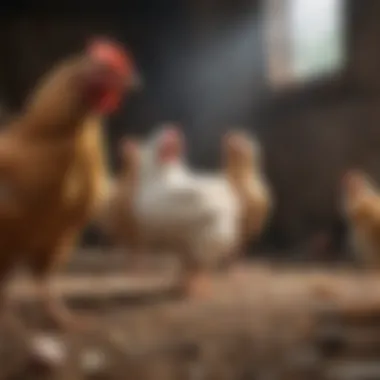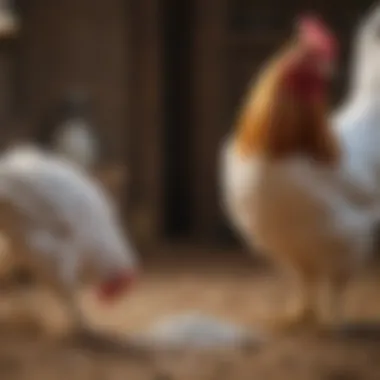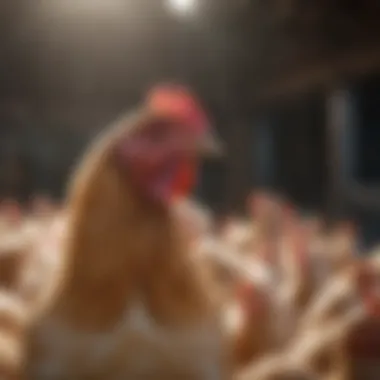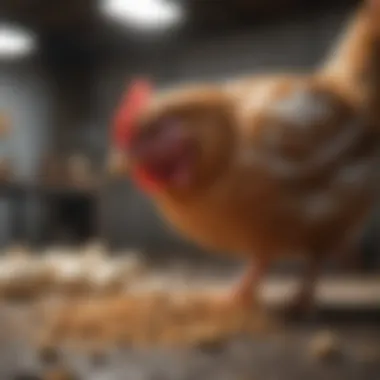Enhancing Calcium Intake for Chickens: Practical Approaches


Intro
Calcium is essential for chickens. It influences egg production, bone health, and overall wellness. Proper calcium intake can boost not just egg quality, but also enhance the bird's strength and health. This article will explore effective methods to enhance calcium consumption in chickens. We will cover dietary strategies, various supplements, and natural food sources rich in calcium. Moreover, we will delve into the effects of calcium deficiency, the optimal calcium requirements for various chicken breeds, and practical tips for integrating calcium into their daily diet.
Having a robust understanding of calcium needs for chickens is vital for all poultry owners. Whether new or experienced, the insights presented here will empower you to take actionable steps to support your flock's health.
Nutrition and Diet Tips
Understanding the nutritional requirements of chickens is critical for their optimal health. Chickens require a balanced diet, including essential vitamins and minerals. Calcium plays an important role, especially for laying hens. Here are some diet modifications you can consider:
- Layer Feed: Use specially formulated layer feeds that already contain adequate calcium levels. These feeds typically include oyster shells or limestone.
- Supplemental Calcium: Add calcium sources, like crushed oyster shell, directly to their feed or provide it separately as free choice.
- Natural Calcium Sources: Include calcium-rich foods like leafy greens, broccoli, and dairy products. These can be integrated into their diet alongside regular grains.
Understanding Calcium's Importance for Chickens
Calcium plays a pivotal role in the overall health and biological functions of chickens. Its importance cannot be overstated, particularly for those involved in poultry farming or ownership. Ensuring adequate calcium intake is fundamental for promoting strong bones, facilitating egg production, and supporting vital bodily functions. Without sufficient calcium, chickens can face severe health issues that impact their longevity and productivity.
Role of Calcium in Chicken Physiology
Calcium is crucial for many bodily functions in chickens. It helps in the formation of bones and teeth, providing structural strength. Additionally, calcium is essential in cellular processes, blood clotting, and muscle contractions. In laying hens, calcium is particularly vital as it directly influences eggshell quality. Good eggshell strength is not only important for the perishable nature of eggs but also impacts the overall productivity of the flock.
Consequences of Calcium Deficiency
Calcium deficiency can lead to multiple health issues in chickens. It is vital to recognize these consequences to implement proper dietary adjustments.
Impact on Egg Production
A lack of calcium significantly hampers egg production. Hens require calcium to form strong eggshells. Without it, the shells may become thin and fragile, leading to increased breakage. The reduced egg quality can negatively affect the poultry owner's economic benefit, making this aspect a high priority.
Effects on Bone Development
Bone integrity is dependent on adequate calcium levels. Young birds, in particular, need sufficient calcium for proper bone development. Inadequate calcium can lead to deformities, making it challenging for birds to thrive. Younger chickens with poor bone density may suffer from increased fractures and mobility issues, ultimately affecting the health and productivity of the flock.
Long-Term Health Issues
Prolonged calcium deficiency can manifest in serious long-term health complications. Chronic deficiency can lead to conditions like osteoporosis, making birds more susceptible to fractures and other age-related issues. Moreover, the overall health of the chickens can decline, leading to reduced lifespans and lower productivity over time. Understanding these long-term implications is essential for any poultry owner to maintain a successful and healthy flock.
All poultry owners must recognize the vital role calcium plays in their birds' health and productivity.
Overall, understanding calcium's significance provides valuable insights into maintaining a healthy chicken population. Awareness leads to better management practices and long-term benefits for both chickens and their owners.
Recommended Calcium Levels for Different Chicken Ages
Understanding the different calcium requirements throughout a chicken's life is crucial for optimal health and productivity. Each life stage demands specific nutritional needs that directly influence growth, bone development, and egg production. By tailoring the calcium intake according to age and needs, poultry owners can vastly improve the well-being and performance of their chickens.
Chickens at Different Life Stages
Chicks


Chicks require a lower level of calcium compared to older chickens. In their early life, a calcium level of 0.9% is adequate to support initial development without placing strain on their kidneys. The key characteristic of chicks is their rapid growth. This makes proper nutrition during this phase essential. Although their bones are still developing, excess calcium can lead to metabolic issues. Thus, controlled calcium levels are advantageous for healthy development.
Pullets
As pullets approach maturity, their calcium needs increase. At this stage, a calcium level of around 1.0% to 1.3% becomes necessary to prepare their bodies for egg production. The specific aspect of pullets is the transition from growth to reproductive readiness. They begin to accumulate calcium reserves, influencing future laying performance. Providing adequate calcium during this stage ensures that pullets develop strong shells and remain healthy.
Hens
For laying hens, the calcium requirement rises significantly, ideally between 3.5% to 4.5%. This increase reflects their need to produce quality eggs. The key characteristic of hens is their reproductive function, requiring a balanced intake for optimal production. Their unique requirement is linked to the calcification of eggshells. Proper calcium levels help in minimizing shell defects and enhancing general health. However, one must be cautious about over-supplementation which could lead to health problems.
Breed-Specific Calcium Needs
Layer Breeds
Layer breeds have a specific need for calcium due to their high egg production rates. These breeds require around 4.0% to 4.5% calcium in their diet. The key characteristic here is the high demand for nutrients to support eggshell formation. This focus on calcium is beneficial as it directly affects not only the quantity but also the quality of eggs produced. A unique feature of layers is their selective feeding behavior, which means they may need additional supplements if they do not consume enough in pellets.
Broilers
Broilers generally require lower calcium levels, around 0.9% to 1.2%, as their focus is primarily on rapid weight gain rather than egg production. The key characteristic of broilers is their breed's growth optimization for meat. This lower level is beneficial to ensure that their primary needs are met without excess deposits leading to health issues. Their unique requirement is essential to balance growth with conditions for fast maturation.
Dual-Purpose Breeds
Dual-purpose breeds fall somewhere in between layers and broilers, requiring moderate calcium levels of about 1.2% to 1.5%. The key characteristic is their ability to produce both eggs and meat. This versatility is beneficial as it allows for more flexibility in feeding strategies. However, their unique feature is that if they are used primarily for meat, their calcium needs might go unaddressed if not periodically monitored. Adjustments in their calcium intake are necessary depending on their role or usage.
Dietary Adjustments to Boost Calcium Intake
Dietary adjustments are crucial in ensuring that chickens receive adequate calcium for optimal health. Calcium plays a vital role in several processes, such as bone formation, muscle function, and egg production. Adjusting diet can effectively enhance calcium intake, reducing the likelihood of deficiencies that can lead to serious health issues. A well-planned diet helps ensure that chickens meet their calcium needs, influencing both their immediate well-being and their long-term productivity.
Incorporating Calcium-Rich Feed
One of the most direct ways to boost calcium intake is to incorporate feed that is rich in this essential mineral. Many commercial feeds are formulated with proper calcium levels, but it's important to choose the right type for specific chicken breeds. Notably, layer feeds contain higher calcium levels compared to broiler feeds. Selecting the appropriate feed ensures that chickens can absorb enough calcium for their growth and production requirements. Doing proper research about feed formulation can make a significant difference.
Utilizing Natural Sources
Natural sources of calcium offer an excellent way to enhance the diet of chickens.
Dark Leafy Greens
Dark leafy greens are a rich source of calcium and other essential nutrients. Spinach, kale, and collard greens can be easily incorporated into the diet of chickens. These greens provide not only calcium but also vitamins and minerals that contribute to overall health. Due to their high nutrient density, dark leafy greens are an appealing choice for poultry owners looking to diversify their chicken's diet. However, it is important to offer these foods in moderation, as excessive amounts may lead to digestive issues in some birds.
Crushed Eggshells
Crushed eggshells serve as an efficient calcium source for chickens. They are high in bioavailable calcium, making them effective for improving overall calcium intake. Many poultry owners appreciate using this natural byproduct, as it promotes sustainability by utilizing leftover materials. The unique feature of crushed eggshells is that they can be fed back to the chickens in a cost-effective manner. However, it is necessary to ensure proper cleaning and crushing to prevent the risk of bacterial contamination or sharp edges that could harm the birds.
Bone Meal
Bone meal is another valuable source of calcium and phosphorus. This meal is made from ground animal bones and is often available in stores. Bone meal is particularly attractive because it offers a concentrated calcium source, making it accessible to poultry needing extra calcium. Its unique feature lies in its slow-release nutrients, which can support continual calcium availability. However, care should be taken to use it in moderation, as excessive feeding may lead to imbalances in nutrient levels.


Commercial Calcium Supplements
When natural food sources are not enough, commercial calcium supplements may be needed. These supplements can provide a targeted approach to ensuring chickens receive adequate calcium.
Calcium Carbonate
Calcium carbonate is one of the most common supplements used to elevate calcium levels in chicken diets. It is widely available and relatively inexpensive, making it a popular choice for poultry farmers. The key characteristic of calcium carbonate is its high calcium content, easily absorbed by chickens. However, care should be taken not to over-supplement, as excess calcium can lead to health issues, particularly in younger birds.
Calcium Citrate
Calcium citrate is another supplement that can enhance calcium intake. It is well-absorbed compared to other forms, like calcium carbonate, which makes it beneficial for chickens that may have digestive challenges. The unique aspect of calcium citrate is that it does not require as much stomach acid for absorption as other calcium sources. While this may be an advantage, it is generally more expensive than calcium carbonate, which can be a consideration for those managing costs in their feeding program.
Proper management of calcium intake is critical for the health of chickens, affecting everything from bone strength to egg quality.
Practical Tips for Implementing Dietary Changes
Effective dietary changes for chickens can vastly improve calcium intake and overall health. Implementing these changes is not simply about adding more calcium, but doing so in a way that chickens can easily adapt to. This ensures their nutritional needs are met without causing digestive issues. Gradual adjustments allow for better acceptance of new foods. It also helps to minimize stress, which is crucial for a healthy poultry environment.
Gradual Prologue of New Foods
When introducing new food sources, such as calcium-rich options, it is essential to do so gradually. Sudden changes can upset a chicken's digestive system. Chickens can be creatures of habit, and altering their diet abruptly may lead to rejection of new foods. Instead, following a careful method of integration can increase the likelihood that chickens will embrace the new dietary items.
Here are some steps to take:
- Start Small: Introduce small amounts of new foods mixed with their usual feed. This makes the transition less intimidating.
- Observe Reactions: Watch how the chickens respond to the new food. Signs of interest can be positive signals, while disinterest, or worse, adverse reactions, need attention.
- Increase Gradually: Once the new food is accepted, increase the amount slowly. This process can take several days or even weeks.
- Stay Consistent: Ensure that their feed remains consistent throughout the introduction process to provide stability and comfort.
Following this method not only enhances calcium intake but also bolsters the diet variety. Chickens benefit from a diverse mixture of nutrients, leading to improved health and productivity.
Offering Calcium Supplements Appropriately
Calcium supplements can serve as an essential part of a chicken's diet, especially if their natural feedings do not meet calcium requirements. However, providing these supplements wisely is crucial. It is important to determine the right type and dosage of the calcium supplement. There are various forms available, such as calcium carbonate and calcium citrate, which each have their own absorption rates and benefits.
Here are considerations for offering supplements:
- Consult a Veterinarian: Before introducing supplements, consulting a veterinarian familiar with poultry is advisable. They can offer guidance on specific needs.
- Balance with Other Nutrients: Ensure that the supplement does not overshadow other important nutrients that the chickens need. Calcium work best when balanced with phosphorus and vitamin D.
- Follow Recommended Dosage: Each calcium supplement typically provides dosage instructions. Adhere to these carefully to avoid over-supplementing, which can cause health issues.
- Provide Alongside Regular Feed: Calcium supplements can be mixed into regular feed or offered separately as treats. Find what works best for your flock.
By approaching calcium supplementation with care, you can support chickens effectively, promoting strong bones and higher egg production.
Proper calcium intake translates to better health and productivity for chickens, shaping their future and that of poultry owners alike.
Monitoring Calcium Levels and Chicken Health
Monitoring calcium levels in chickens is crucial for a variety of reasons. Ensuring that your flock receives an adequate supply of calcium promotes optimal health and productivity. Calcium supports vital processes such as bone development, muscle function, and eggshell formation. Keeping track of calcium intake helps poultry owners identify potential issues before they escalate into significant health concerns. It also enhances the overall well-being of the chickens, leading to improved egg production and healthier birds.
Signs of Adequate Calcium Intake
To assess whether chickens are receiving sufficient calcium, certain signs can be observed. Healthy chickens typically exhibit strong bones and produce eggs with hard, intact shells. Other indicators include:


- Normal Behavior: Chickens that are active, exhibit normal feeding behavior, and maintain a healthy weight are likely meeting their calcium needs.
- Egg Quality: A consistent production of eggs with robust shells indicates that the calcium intake is adequate.
- Healthy Plumage: Well-nourished chickens often display vibrant feathering, a sign of good overall health.
Regular checks on calcium intake can lead to early detection of both over-supplementation and deficiency.
Proper monitoring ensures that dietary adjustments can be made before deficiencies manifest into severe health problems.
Identifying Signs of Calcium Deficiency
Recognizing signs of calcium deficiency is crucial for timely intervention. Deficiency can result in serious health repercussions for chickens. Key signs include:
- Soft or Thin Eggshells: One of the most apparent indicators is a decrease in eggshell quality. Thin, fragile, or even misshapen eggs suggest insufficient calcium.
- Bone Issues: Chickens experiencing difficulty moving or showing signs of weakened bones may suffer from calcium deficiency, leading to fractures or deformities.
- Reduced Egg Production: A drop in the number of eggs laid can signal an inadequate calcium supply, as the body prioritizes survival over reproduction when nutrient levels are low.
- Behavioral Changes: Chickens may exhibit signs of lethargy or decreased activity levels, indicating their health is compromised.
To prevent these issues, it is vital to observe and adapt to changes in chicken health promptly. The well-being of your flock hinges on diligent monitoring of their calcium intake.
Environmental Factors Affecting Calcium Absorption
Understanding the environmental factors that affect calcium absorption is crucial for maintaining optimal health in chickens. Absorption is not solely a matter of what is provided in the diet; various external elements play a significant role in the effectiveness of calcium utilization in the body. Factors such as stress, disease, and the presence of essential vitamins can substantially influence how well chickens absorb calcium. By addressing these environmental elements, poultry owners can ensure that their chickens receive maximum benefit from the calcium sources available to them.
Impact of Stress and Disease
Stress in chickens can lead to a decrease in calcium absorption. Stressors can range from changes in weather, overcrowding, to routine handling. When a chicken becomes stressed, its body prioritizes survival, possibly leading to decreased digestion and nutrient uptake, including calcium.
- Signs of Stress: Look for behavioral changes, reduced feed intake, or increased aggression.
- Environmental Adjustments: Providing adequate space, proper ventilation, and a calm environment are essential.
In addition to stress, diseases can further complicate calcium absorption. Illnesses that affect the gastrointestinal system can hinder the ability of chickens to absorb nutrients effectively. For instance, infections can lead to inflammation of the intestinal lining, disrupting nutrient transport.
To mitigate these issues, regular health check-ups and a well-managed environment are critical. Recognizing early signs of disease and treating them promptly can support better overall health and calcium absorption.
Role of Vitamin
Vitamin D plays an indispensable role in calcium metabolism. It helps regulate calcium and phosphate levels in the bloodstream, ensuring that calcium is available for absorption in the intestines. Without adequate levels of Vitamin D, even a diet rich in calcium might result in poor absorption.
- Sources of Vitamin D: Direct sunlight is a primary source, but providing fortified feed can also help maintain appropriate levels.
- Supplementation Considerations: For indoor or limited free-range chickens, consider Vitamin D3 supplements to support calcium metabolism.
The relationship between Vitamin D and calcium absorption indicates the need for a comprehensive approach to chicken nutrition. It's not just about adding calcium; ensuring that chickens have sufficientVitamin D will enhance the benefits of the calcium they consume.
Important Note: Regularly monitor the levels of Vitamin D in your chicken's diet, especially in environments where access to sunlight is restricted.
By understanding and managing these environmental factors, poultry owners can improve calcium absorption, leading to healthier chickens with better egg production and bone health.
End: Ensuring Optimal Calcium Intake for Healthy Chickens
The benefits of maintaining appropriate calcium levels extend beyond mere egg production. Healthy bones support mobility, allowing chickens to thrive in their environment. Additionally, adequate calcium contributes to the strength and quality of eggshells. Weak shells often result from insufficient calcium, impacting not only the birds' health but also their marketability and productivity.
It is crucial for poultry owners to recognize the specific calcium requirements based on the age and breed of their chickens. Young chicks, pullets, and mature hens all have varying needs that can greatly influence their growth and output. Understanding these differences enables better dietary planning and management.
Adopting practical approaches to enhance calcium intake may involve several strategies. Incorporating calcium-rich feed, leveraging natural food sources, and considering calcium supplements are all viable options. Monitoring calcium levels should become routine to ensure that any signs of deficiency are promptly addressed.
Considerations regarding environmental factors also play a vital role in calcium absorption. Stress from overcrowding and inadequate housing can hinder absorption, while vitamin D is crucial in optimizing calcium uptake. Awareness of these factors can help poultry owners create a supportive environment for their chickens.
As a final point, poultry owners should prioritize regular assessments to ensure that their chickens receive adequate calcium, significantly impacting their health, productivity, and long-term welfare.
In summary, optimal calcium intake is fundamental for maintaining a healthy flock. A thorough understanding of calcium's importance, tailored nutritional strategies, and awareness of external factors will provide chickens with the best possible care, leading to improved health and productivity.







